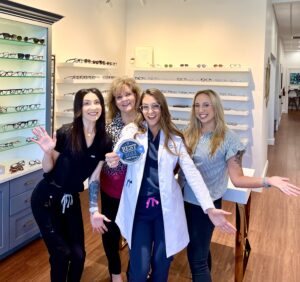
Audrey Raley, OD, with practice team. Dr. Raley says she has learned to step up to leadership in her practice, realizing that she is the one ultimately responsible for her team’s performance and the experience of patients.
How to be accountable for everything that happens in your office.
By Audrey Raley, OD
Feb. 28, 2024
I first began my journey as an optometric business owner when I cold-started my practice five years ago. As most would agree, the hardest part of practice ownership is managing people. Every day, I found myself highly motivated to get “it all done,” but became aggravated by team members who dropped the ball or seemed to lack initiative.
All too many times, I ended up in a conversation with a colleague that revolved around complaints of staff members and their pitfalls. Our problems were that employees were simply under-performing or unwilling. We also complained about their appearances, their timeliness, their mistakes that cost us money and all the things we wish they did better. Sound familiar? Why do we have these problems? How can we change the outcomes? It’s time to shift your mindset and perspective.
A Hard Look in the Mirror
As the CEO of an optometric practice, you understand that you are responsible for profitability, top-line revenue, and in most cases, the operations that are carried out on a daily basis. I made a common mistake in assuming the people I hired would automatically handle all the tasks that their job required, or that if they innately had good “initiative” they would resolve problems immediately.
I want to challenge you that this is a backwards way of thinking. If your team is not performing to the level of your expectations, realize that it is typically not them; it’s you. In fact, Harvard Business Review showed that “82 percent of managers have limited to no ability to hold others accountable successfully.”
Additionally, 91 percent of employees say that accountability “is one of their company’s top leadership-developmental needs.” If tasks are not being performed in the way that you intended, it is usually due to one or more of the following: lack of leadership, lack of training, not providing the tools needed to accomplish the task(s), or the biggest downfall of all, not providing enough feedback.
CAO vs. CEO
Start thinking of yourself as the Chief Accountability Officer, rather than the Chief Executive Officer. I learned this concept from a successful, female entrepreneur and investor, Leila Hormozi. Common misconceptions or beliefs that may arise in your mind are: “I don’t want to babysit people” and “We are all adults here.” You may feel as though you shouldn’t have to take the already limited, precious time out of your day to follow-up or hold them accountable, when in fact, that is exactly what you have signed up to do!
World-class leaders and successful CEOs understand that you must constantly and consistently “set the tone” by holding yourself and everyone in the company accountable for their actions. They will need constant feedback from you, as well as recognition for the things that go well and the things that don’t. Get comfortable with providing both types of feedback. So, how do you do this?
Tactical Accountability
Don’t make the mistake I did of being frustrated about making small accountability critiques to your employees. Like any skill you develop, the execution requires practice. Here are some ways I practiced tactical accountability.
One day while answering the phone I noticed our new hire had on severely spotted and chipped black nail polish. At the end of the day, in a one-on-one casual setting, I approached her, “You look incredibly professional with your outfits, I am so impressed! But I noticed your nails are not well kept, which was a surprise since that doesn’t seem to match your style?” Embarrassed, she expressed that she knew this was not the best representation of personal appearance that we strive for at our practice, and came back the next day with the leftover polish removed.
Other Articles to Explore
The key is to realize that if you have never explicitly spelled out a protocol or rule, you cannot expect your team to “just know.”
We have an administrative morning on Thursdays. This means no patients are scheduled and the time is focused on back-of-the-office upkeep and larger-scale projects. When I learned that some of my team members were utilizing their personal phones to audibly play podcasts and stream shows during the administrative time, I used a phrase that I learned from one of my mentors: “Listen, I hate to be the fun police here. but….” This is a great lead-in to explain why a particular behavior is not in alignment with my expectations.
My knee-jerk reaction would be to think that they should have known that this was inappropriate. But then I realized, this has never once come up, and has never been an issue. Even if it had, it is my job to uphold our practice standards.
You can apply tactical accountability to being on time, how to behave/speak, dress code, organization and cleanliness, or any other definable expectations you may have. The way in which you deliver tactical accountability should be non-threatening and never belittling. While it will require you to address things you do not believe you should have to, it will allow you to become less frustrated, and your employees will appreciate the clarity on what is expected of them. Don’t make them assume or guess, and don’t wait to provide the feedback. The sooner, the better.
Developmental Accountability
Can you hold your team accountable to their career goals? Keep them accountable to their growth in the business by coaching them on developing character traits that align with the practice core values. You want to provide consistent feedback on how they respond to problems they may face during the day in an optometric setting. These are the instances of handling difficult patients, incorrect or delayed eyewear orders, explaining insurance benefits, etc.
My optician found herself dealing with a patient who was demanding and unpleasant. She thought she may need my help in speaking with them to “cool things down.” Whereas in the past I may have jumped in to “take over,” I now practice the Ritz Carlton method.
Ritz-Carlton teaches its employees they are empowered to solve problems on their own: “Each [employee] at the Ritz-Carlton, at all levels, are empowered to spend a dedicated amount [$X] per guest, per incident” to make their guest happy and comfortable.” Using this technique, I let my optician know that she is capable, she controls the narrative and I trust her decisions.
This type of coaching should be on a frequent basis. Try not to save this type of coaching for the “performance review.” Harvard Business also found that 69 percent of employees don’t feel they’re living up to their potential at work.” With that in mind, set goals with associated deadlines, and ensure they can adhere to them. Motivating someone to grow out of desire and not out of fear is important. Be sure to recognize them for their wins. If you can master developmental accountability, your ideal employee behavior will be reinforced, and turnover will reduce.
I also require my team to obtain professional certifications in their first year with our company. We frame these achievements and display them proudly for our patients to admire. If you remember one thing about developmental accountability it’s this: focus on their personal success, and the success of the business will follow.
Committing
Last but not least, as the CAO, always carefully consider your actions and your communication. Your actions are constantly influencing your team. Attitude works the same. Be cognizant of how you show up to your team and how you communicate to them. Look at your own failures before theirs. Be ready to give feedback, good and bad, formal or informal, all of the time.
As Hormozi says, “Shortcuts in communication today lead to deterioration of trust tomorrow.” Let go of the guilt or awkwardness you may feel about holding your adult employees accountable and commit yourself to the CAO mindset.
 Audrey Raley, OD, is the owner of Refined Eye Care & Eyewear Gallery in New Braunfels, Texas. To contact her: audreyraley@gmail.com
Audrey Raley, OD, is the owner of Refined Eye Care & Eyewear Gallery in New Braunfels, Texas. To contact her: audreyraley@gmail.com

























